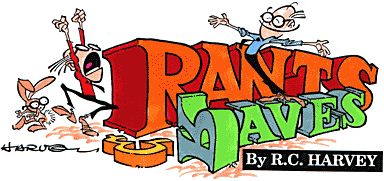| |
Opus Eight:
1. Tarzan:
A Genuine Animated Cartoon At Last (9/8)
1. Tarzan:
A Genuine Animated Cartoon At Last. With Tarzan, Disney restores
the sheen on its reputation as the premier animation studio. My complaint
for several of the most recent films is that the same story could be
told live-action; so why make an animated film? The most notable offender
in this regard is Beauty and the Beast, which was transformed into a
Broadway theatrical production without visible effort. Demonstrably,
we didn't need animation to tell the story Disney told in this production.
An animated cartoon, it seems to me, should do things that can't be
done in live-action film. Admittedly, since Lucasfilms, almost anything
can be done in live-action through the machinations of special effects.
Still, special effects are not, really, "live action": they're engineered
action, and they transform a film into a species of animation. But that
scarcely changes what I see as the over-arching function of animation:
to tell a story in ways that live-action can't. And Disney's Tarzan
does that with panache. The film has received raves on every hand, and
I don't intend, here, to repeat any of those or to rehearse every dazzling
aspect of the film. Instead, I'll mention just the things that impressed
the hell out of me. At the top of the list, character design.
Supervising animator Glen Keane avoided
making Tarzan a bicep-bulging Arnold Schwarzenegger. It was a canny
inspiration. Keane's Tarzan radiates athleticism: he's broad-shouldered
but otherwise pretty lean and sinewy--"muscled more like Apollo than
Hercules," as Burroughs himself said; just the sort of build you'd expect
to find with a man who swings through the jungle on vines. And Tarzan's
visage--simply rendered--has a haunting intensity wholly appropriate
but seldom seen in animated cartoon characters.
Jane Porter is likewise an inspired creation.
She is perky and cute, which turns out to be precisely the sort of thing
that makes her work superbly as both a comedy character and the female
romantic lead. For once, Disney managed to arrange a love story without
getting bogged down in saccharine sentimentality. (There is sentimentality
in this movie, but it doesn't slow down the production.) And the thing
that rescues the romance from the overweening sweetness that usually
clogs the works is Jane's design and personality--in short, her perfectly
realized function as the film's comedienne.
Of Jane's father, Professor Porter, the
less said, the better. As a cartoon character design, he's a throw-back
to another animation era, the thirties perhaps. His presence almost
jars, but it is so quickly and repeatedly overwhelmed by the stylish
designs everywhere else that we can easily forget him.
Burroughs purists will also have to wink
at certain changes the Disney elves have wrought in the story. Thematically,
it's still about man's search for himself, his true self. But much of
Burroughs' lumbering plot had to be abbreviated or thrown out altogether.
Moreover, many of the traditional deaths take place so far off-camera
that we become aware of them more by intellectual inference than by
eye-witness. Still, the Disney team had the sense to realize that death
permeates the Tarzan legend and that the tale can't be rehearsed again
without some dying. The dying, however, is usually managed without apparent
bloodshed. Tarzan kills a leopard, his gorilla father is killed by the
white hunter Clayton, and Clayton himself, having been proved a thoroughly
reprehensible sort, manages to cause his own death by hanging (a startlingly
effective sequence, tastefully but not squeamishly handled). Despite
the abbreviations and the omissions, the essential flavor of the legend
is preserved--and, in some ways, enhanced.
Another thing that is missing in this
production is the customary Disney cute comedy character as a sidekick
for the hero. That's odd, considering that the jungle offers a trove
of possibilities. Most Hollywood versions of the Tarzan legend include
a comedic chimpanzee, for instance. But there are scores of other candidates
for the role, including any of hundreds of colorful birds. But there
are no Jimminy Crickets here. True, one of Tarzan's gorilla chums is
a sidekick of sorts; ditto Tantor the elephant. But neither quite fills
the bill of slapstick comradeship. (Tarzan is essentially a loner, after
all: that's his dilemma.) A tiny monkey shows up briefly, but he scarcely
fulfills the usual simpering chimp slot.
Some in the audience may regard this omission
as a blessing. Certainly in recent years, the role, whenever it rears
its head of spastic forced hilarity, has worn pretty thin. I'm undecided.
I missed it here, but I'm not quite sure I would have welcomed another
wild try at the part by a whirling Macaw, for instance.
The Dark Horse comic book adaptation,
by the way, does a credible job in translating all the movie into static
panels, retaining both the visual character of the film and the storyline,
nearly word-for-word (two issues, each $2.95). Too bad, though, that
the pictures are so tiny. And what does this movie do that live-action
can't do? First among other shimmering attainments, it achieves a credible
vision of the Ape Man: until Tarzan starts walking erect towards the
end of the movie, he walks like a gorilla--on his knuckles, hunched
over, his legs doubled up under him like a frog's--and the plasticity
of animation persuades us that it is possible for a man to move around
like this. With remarkable agility, even. Moreover, animation shows
us Tarzan jazzin' through the jungle, surfing the tree limbs and swinging
on the vines. And it's all fast, fast, fast. According to report, Tarzan's
creator, the legendary Burroughs, thought his creation could be brought
to the screen successfully only as an animated character. And Disney
proves him right.
return
to top of page

return to archive main page
To find out about Harv's
books, click here.
|

